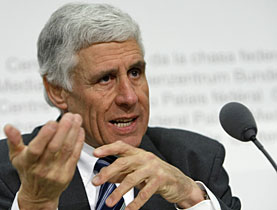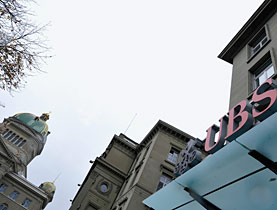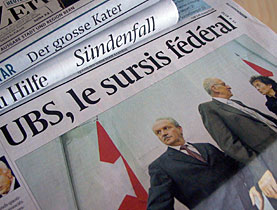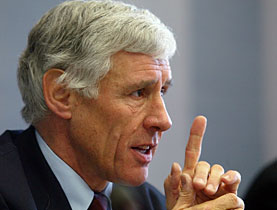“Profits stay private, state takes the losses”

This week the Swiss government intervened to bolster the ailing banking giant UBS, using tens of billions in taxpayer money and setting a far-reaching precedent.
Rudolf Strahm, a finance expert and former price regulator, has taken a critical view of the move and explains to swissinfo how he would have handled the situation differently.
Most commentators welcomed the government’s rescue package, seeing it as a necessary evil.
Strahm, a former Social Democratic Party parliamentarian, argues that this bailout should be followed by changes in the regulation and structure of the country’s two largest banks.
swissinfo: Switzerland has paid $54 billion (SFr61.25 billion) for UBS securities that are now unsellable. Is this a good deal, as the government would have us believe?
Rudolf Strahm: To me that’s a risky statement. The cabinet is playing down the risk, presenting the situation as if this support action could be a good deal for the country. The cabinet wanted to give itself some consolation in this debacle.
By taking on the securities through the Swiss National Bank, it will benefit from a portion of the securities, which will appreciate in value. But with the very bad, rotten securities, the losses will be irretrievable.
The worst securities now stand at between nine and 15 per cent of their original value and are still falling. Even if these doubled or tripled in value, it would not bring us near the price paid. This loss will of course be shouldered by the National Bank.
swissinfo: Does UBS then not have to take responsibility for the losses coming from these securities?
R.S.: No it does not. This risk is now carried by the National Bank. UBS has now agreed on a division of profit with the National Bank, should there be a profit. But if this business ultimately ends in loss, the National Bank will pay nine tenths of that from the public purse.
Despite all the Cabinet’s protestations, this works according to the system profits stay private and the state pays the losses.
swissinfo: Then would the government have done better not to have got involved?
R.S.: The fire is there and must be put out. But the one who started the fire should be punished more and fire fighting should be improved at the same time.
If we had had higher capital reserves provisions for the two largest banks years ago, this fire could have been prevented. The current provisions for the banks, known as “Basel II”, are rubbish. They have not proven reliable and therefore must be changed.
The biggest insecurity in the system is that the banks assess their own risks. This opened the door to manipulation.
UBS is a case in point. Before the beginning of the crisis, it calculated its credit risk at SFr800 million. Now it has to write down SFr40 billion – that’s 50 times more. In other words, this risk measure is wide open to manipulation.
Having sufficient capital resources is the only buffer that works in a crisis. Otherwise the state has to step in.
swissinfo: Now this has happened. Would you have reacted differently?
R.S.: I personally would have preferred to see things being financed exactly the opposite way, like the British prime minister Gordon Brown did – the state takes shares in the ailing banks.
So of course he takes on risks but also has a share in later gains. Most Europeans and later the United States itself went along these lines.
The Swiss authorities are doing exactly the opposite in that they spending nine-tenths of their intervention on buying junk securities one tenth on convertible bonds which offer a chance of later gains. That is a purely bank orientated solution and not in the interests of the state’s finances.
swissinfo: Is the man on the street also affected by this?
R.S.: At the moment there is no direct effect on the budget. But sooner or later the losses will naturally be paid from the public purse – whether that’s through National Bank funds or the state coffers.
swissinfo: Alongside the capital injection given to UBS, the government also announced a future increase in the deposit guarantee. Is that a sweetener for the average person, so that he will better accept the billions for UBS?
R.S.: That is an important stabilisation measure, to prevent more people from taking their savings out of UBS, then reducing bank’s capitalisation even further. I welcome that but also believe that it is time for a legal solution with a fund that should be topped up by the banks.
Up to now there has been no insurance solution, because it was only dependent on a solidarity payment, with no underlying security.
An increase [in the deposit guarantee] is unlikely to be useful to those hurt by this crisis. The cabinet is only submitting a new draft law. That is at most of interest for the next crisis.
swissinfo: Will UBS get back on its feet?
R.S.: I assume so, as the bank is strongly dependent on the private wealth management business. Without this it would probably have gone bankrupt, like various American investment banks.
I hope that UBS and Credit Suisse will later unload their investment banking units. Shareholders and those willing to speculate can then finance these businesses. Switzerland is too small to sustain such enormous banks and provide security.
And this crisis shows that there is effectively a state guarantee in place for the two largest financial entities. The state cannot allow either of them to fall. These large banks are however too large for Switzerland alone to be able to save them.
swissinfo-interview: Etienne Strebel
The Swiss National Bank (SNB) has agreed to put SFr6 billion ($5.29 billion) into UBS, in a move that aims to strengthen the bank’s capital base and reduce its balance sheet.
In return, Switzerland’s central bank will take a 9.3 per cent stake in UBS.
Based on an agreement with the SNB, UBS will transfer up to $60 billion of assets to a newly created fund entity and will capitalise the fund with equity of up to $6 billion.
The SNB will finance the fund with a loan of up to $54 billion, secured on the assets of the fund, taking over control and ownership of the entity.
Savings accountholders are protected by a deposit guarantee up to SFr30,000. The banks, rather than the state, cover this.
There is no upper limit for accounts held in the post office or cantonal banks, which are backed by state and cantonal guarantees.
After many clients began to transfer their savings from the large banks into the cantonal banks, the government indicated it wanted parliament as an immediate measure to allow a “reasonable” increase in the protected amount.
The cabinet wants to align Switzerland with the increased guarantees now on offer in EU countries. Last week, EU finance ministers agreed to increase the deposit guarantee from €20,000 (SFr30,449) to €50,000.
Born in 1943, Strahm grew up in the Emmental region. After an apprenticeship as a laboratory assistant, he went on to gain a diploma as a chemist.
He later studied economics and business management at Bern University.
Strahm has worked at the United Nations Conference on Trade and Development, has lectured at Zurich University and was head of a number of various associations and organisations.
He has written on economic policy and teaches career advisers at the universities of Bern, Fribourg and Zurich.
From 1991 to 2004, he was a Social Democratic member of the Swiss House of Representatives.
In 2004, he was appointed the federal price regulator by the government.
He stepped down in 2008 after reaching the retirement age of 65 and will now, among other activities, write columns for two Swiss newspapers and a blog for the Swiss National Bank.

In compliance with the JTI standards
More: SWI swissinfo.ch certified by the Journalism Trust Initiative



You can find an overview of ongoing debates with our journalists here. Please join us!
If you want to start a conversation about a topic raised in this article or want to report factual errors, email us at english@swissinfo.ch.